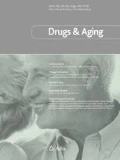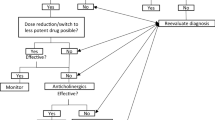Summary
Drug-induced Parkinsonism is a frequent adverse effect of numerous drugs interfering with dopamine function at the basal ganglionic level. It accounts for 4% of all patients with Parkinsonism seen in neurology clinics. Pharmacological agents implicated in the production of this disorder have a wide range of applications in medicine, beyond the treatment of psychiatric illnesses. Antipsychotics, substituted benzamides and calcium channel blockers are the drugs most commonly involved.
The aged population is at an increased risk of drug-induced Parkinsonism due to intrinsic factors and because they often receive multiple drugs, including those from self-medication. Lack of knowledge in the medical profession of the potential hazards involved in the use of certain drugs plays a contributory role in the development of drug-induced Parkinsonism. Physicians should be always alert in order to detect, as early as possible, the presence of extrapyramidal symptoms in patients exposed to medications with antidopaminergic properties.
Whenever possible, withdrawal of the medication will help resolve symptoms; complete remission takes place within 6 to 18 months in the majority of patients. The use of anti-Parkinsonian drugs is only advisable if the symptomatology is disabling. The best available treatment is prevention.
Similar content being viewed by others
References
Stacy M, Jankovic J. Differential diagnosis of Parkinson’s disease and the Parkinsonism plus syndromes. Neurol Clin 1992; 10: 341–5
McCreadie RG. The Nithsdale schizophrenia surveys: an overview. Soc Psychiatry Psychiatr Epidemiol 1992; 27(1): 40–5
Weiner WJ, Lang AE. Drug-induced movement disorders. In: Weiner WJ, Lang AE, editors. Movement disorders: a comprehensive survey. New York: Futura, 1989: 599–644
McCreadie RG, Hall DJ, Berry IJ, et al. The Nithsdale schizophrenia surveys. X: obstetric complications, family history and abnormal movements. Br J Psychiatry 1992; 160: 799–805
Gimenez Roldan S, Mateo D. Cinnarizine-induced parkinsonism susceptibility related to aging and essential tremor. Clin Neuropharmacol 1991; 14(2): 156–64
Garcia-Ruiz PJ, de Yebenes JG, Jimenez-Jimenez FJ, et al. Parkinsonism associated with calcium channel blockers: a prospective follow-up study. Clin Neuropharmacol 1992; 15(1): 19–26
Delay J, Deniker P, Harl JM. Utilisation en therapeutique psychiatrique d’une phenothiazine d’action centrale elective (4560 RP). Ann Med Psychol (Paris) 1952; 110: 112–7
Ayd FJ. A survey of drug-induced extrapyramidal reactions. JAMA 1961; 175: 1054–60
Chivers JK, Gommeren W, Leysen JE, et al. Comparison of the in-vitro receptor selectivity of substituted benzamide drugs for brain neurotransmitter receptors. J Pharm Pharmacol 1988; 40: 415–21
Montagna P, Gabellini AS, Monari L, et al. Parkinsonian syndrome after long-term treatment with clebopride. Mov Disord 1992; 7(1): 89–90
Jankovic J, Orman J. Tetrabenazine therapy of dystonia, chorea, tics, and other dyskinesias. Neurology 1988; 38: 391–4
Chouza C, Caamaño JL, Aljanati R, et al. Parkinsonism, tardive dyskinesia, akathisia, and depression induced by flunarizine. Lancet 1986; 2: 1303–4
Marti-Masso JF, Carrera N, Urtasun M. Newer drugs inducing parkinsonism. In: Ninth International Symposium on Parkinson’s Disease: book of abstracts. 1988 Jun 5–9; Jerusalem. Jerusalem, 1988: 137
Marti-Masso JF, Carrera N, Urtasun M. Drug-Induced Parkinsonism: a growing list [letter]. Mov Disord 1993; 8(1): 125
Wiseman LR, Faulds D. Cisapride: an updated review of its pharmacology and therapeutic efficacy as a prokinetic agent in gastrointestinal motility disorders. Drugs 1994; 47: 116–52
Laporte JR, Capeila D. Useless drugs are not placebos: lessons from flunarizine and cinnarizine. Lancet 1986; 1: 853–4
Garcia Ruiz PJ, Mena MA, Penafiel N, et al. Cinnarizineinduced parkinsonism in primates. Clin Neuropharmacol 1992; 15(2): 152–4
Stephen PJ, Williamson J. Drug-induced Parkinsonism in the elderly. Lancet 1984; 2: 1082–3
Yassa R, Lal S. Prevalence of the rabbit syndrome. Am J Psychiatry 1986; 143: 656–7
Gershanik, O. Drug-induced movement disorders. Curr Opin Neurol Neurosurg 1993; 6(3): 369–76
Melamed E, Achiron A, Shapira A, et al. Persistent and progressive parkinsonism after discontinuation of chronic neuroleptic therapy: an additional tardive syndrome. Clin Neuropharmacol 1991; 14(3): 273–8
Bersani G, Grispini A, Marini S, et al. 5-HT2 antagonist ritanserin in neuroleptic-induced parkinsonism: a double-blind comparison with orphenadrine and placebo. Clin Neuropharmacol 1990; 13(6): 500–6
Author information
Authors and Affiliations
Rights and permissions
About this article
Cite this article
Gershanik, O.S. Drug-Induced Parkinsonism in the Aged. Drugs & Aging 5, 127–132 (1994). https://doi.org/10.2165/00002512-199405020-00006
Published:
Issue Date:
DOI: https://doi.org/10.2165/00002512-199405020-00006




